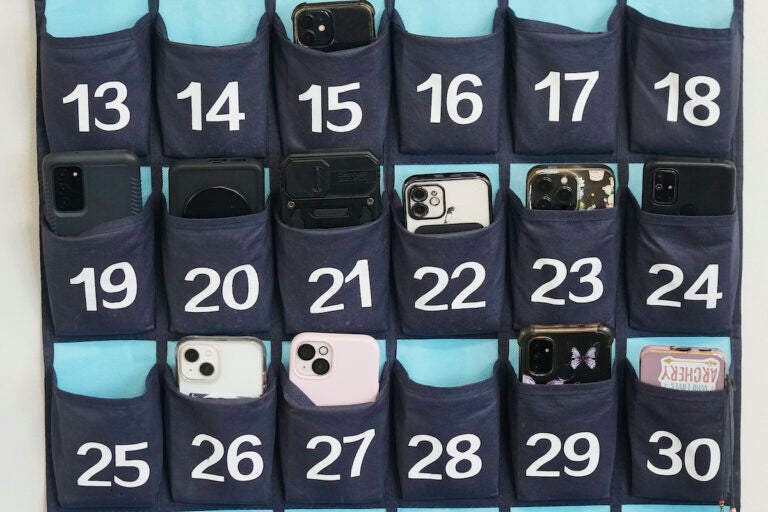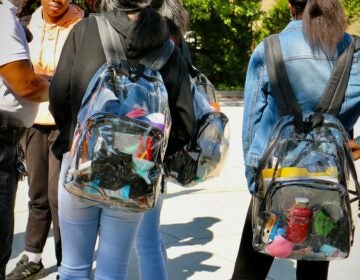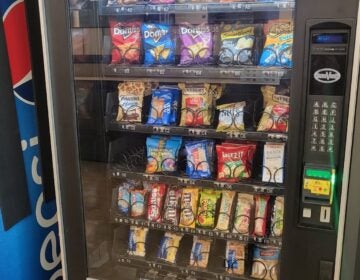No more distractions: Delaware lawmakers back effort to seal away cell phones in the classroom
Lawmakers approved $250,000 for schools to test out ways of ending the distraction caused by cell phones in the classroom.
Listen 2:24
A phone holder hangs in a classroom at Delta High School in Delta, Utah. An example of what some Delaware schools have implemented. (AP Photo/Rick Bowmer)
From Philly and the Pa. suburbs to South Jersey and Delaware, what would you like WHYY News to cover? Let us know!
Across the country, schools are increasingly embracing policies to either ban cell phones or limit their use in the classroom. The new rules aim to reduce distractions and foster the development of student’s social and emotional skills, ultimately creating a more focused and supportive learning environment.
At the close of this year’s legislative session, Delaware lawmakers approved a $168 million supplemental spending bill that included money for a plethora of one-time expenses. The measure includes $250,000 for the Department of Education to implement a cell phone pilot program focused on the use of phone pouches.
Bill sponsor state Sen. Trey Paradee, D-Dover, says restricting cell phone use is something that even music artists are implementing to help reduce distractions for concertgoers. He said students could similarly benefit.
“My wife and I went to a Silk Sonic concert in Vegas a couple years ago, and as you went through security, they took your phones, put them in a pouch, handed them back to you and it made the whole concert experience so much better,” he said.
“You talk to any teachers, they will tell you that cell phones are a major distraction just in terms of learning in the classroom, but there’s also all the other effects,” he said, referencing how cell phones can interfere with the development of social skills. “If you walk into a cafeteria in the typical school during lunchtime these days, all the kids are just hunched over, staring at their screens rather than communicating amongst each other and that’s very unfortunate.”
Inspired by his own concert experience and a story in the Washington Posts about a Connecticut school using phone pouches, Paradee proposed the idea to fellow lawmakers in the spring. He suggested a pilot program could introduce phone pouches in five to eight schools across the state.
He said the reaction was instant support.
“I want to see different types of schools up and down the state have an opportunity to participate. A couple middle schools, a couple high schools, you know, so some participation in all three counties, so we have a good cross section,” he said.
Two years in: the impact of phone pouches at George Read Middle School
Colonial School District is leading the way in the test effort after introducing its own cell phone policy two years ago. Even before the pilot program, Colonial embraced the motto “out of sight, out of mind,” and set out to enhance students’ social, emotional, and overall well-being by restricting phone use.
Upon returning to in-person learning after the pandemic, leaders at George Read Middle School noticed a significant rise in students using cell phones, a habit likely exacerbated by the prolonged period of virtual schooling and isolation.
After researching the benefits of YONDR pouches and examining the effects of cell phones in schools, Principal Nick Wolfe introduced the school’s phone pouch policy.
“My goal was not to limit disruption and increase student engagement, but it is really about the social emotional needs, you know community building and really the mental health of our young people and I just cannot state that enough,” he said. “Those [reduced disruption] are unintended and very much appreciated consequences of our decision to prevent student use of the phones and social media at school.”
While the policy isn’t mandatory, teachers have observed a positive change in the school’s atmosphere.
“We’re not seeing [the phones] in the hallways or the cafeterias or classrooms very often,” Wolfe said. “It’s such a big difference for us in terms of how kids can be kids, but also be able to have almost a distraction-free time while they’re with their teachers.”
To gather feedback, the middle school convened a council of 20 teachers, and their responses have been overwhelmingly positive.
“They’re the ones that are out in the trenches and so I’m constantly asking and getting feedback from them and they say it’s so nice to not have to worry about cell phones all the time anymore,” he said.
Wolfe advises that while implementing a phone pouch policy won’t completely eliminate distractions or significantly affect academic performance, it’s about setting the right environment.
“If anyone is thinking that by purchasing YONDR pouches that this is a ‘magic bullet’ that’s all of a sudden gonna stop students from being distracted and whatever else, they are completely missing the mark,” he emphasized. “The reality is that this is a school climate initiative more than anything else. Our job as school leaders is to ensure that we are establishing conditions in our buildings that allow kids to learn.”
Southern Delaware high schools craft their own phone policies
With schools vary in their cultures and teaching approaches, schools in southern Delaware have approached phone policies differently particularly at the high school level where students are more mature and responsible for their decisions.
Brandywine High School and the Smyrna School District are among the latest schools to implement cell phone policies for the upcoming school year separate from the legislative pilot project.
At Sussex Central High School, there is no school-wide policy on phones, but a few classrooms have implemented their own rules.
“The teachers at my school, we have the autonomy to create our own cell phone policies,” said Jeff Gartman, who teaches media and technology. “The administration gives us that freedom to make our own decisions and they trust us to do what’s best for our classroom.”
A number of teachers at Sussex Central use phones as a tool to foster discussions or facilitate research among students. Yet, after 20 years of teaching, Gartman recognized the devices can also pose a distraction that needs to be addressed in his classroom.
“It piles up to lost time, lost engagement and getting kids being less productive and the whole environment being less effective,” he said. “Personally, I have been struggling with this for years, trying different ways of managing it and I was just not successful with really fighting off the distraction that the phones are to students when they have them in their possession.”
What works for him and other teachers in his building is eliminating cell phone access, a policy he started last spring. This decision prompted him to purchase a hanging storage organizer with little pouches. Each pouch is assigned to a student with their name for every period throughout the day.
“Students come into my room and there’s a pouch hanging on the wall with a bunch of individual pouches. They’ve got their name on one of them. They come in, they put the phone in there,” he described. “I’ve even got it rigged up so they can charge their phone while they are in class, about two minutes before the bell rings at the end of class I allow them to come get it.”
After two months of implementing the policy, despite initial concerns, he now feels accomplished and pleased with the positive feedback from parents and students. He has noticed a noticeable improvement in his students and the overall classroom environment.
“For the most part taking the distraction away just added to the whole environment and kids were more productive, less distracted, and got more done,” said Gartman.
State Sen. Paradee says the phone pouches test pilot may not be ready in time for this school year since the state Department of Education is just drafting its regulation. He says the goal is to have the funds available for schools by the middle of the school year.
He encourages parents, guardians and caregivers to give the test pilot a chance. “My message to all the parents, grandparents, caregivers: hang in there, give it a shot and we’ll work through this.”

Get daily updates from WHYY News!
WHYY is your source for fact-based, in-depth journalism and information. As a nonprofit organization, we rely on financial support from readers like you. Please give today.







